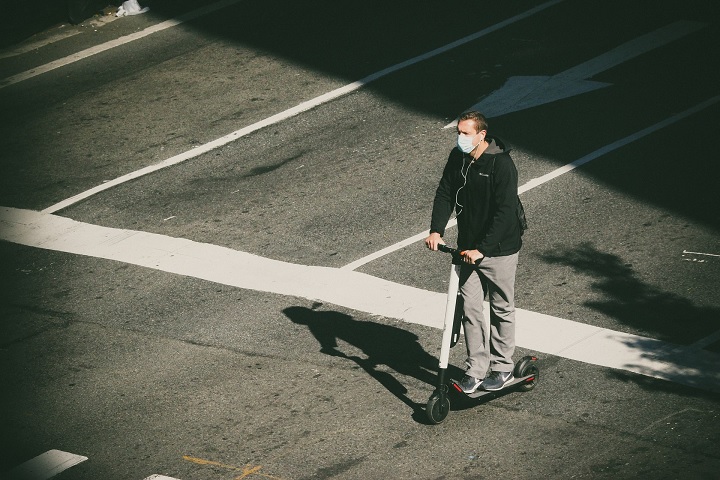
Image: PACTS
A new report recommends that the DfT takes immediate action to address dangerous and illegal private e-scooter use.
The report has been produced by PACTS following the culmination of a project funded by the Road Safety Trust to gather information on the safety of private e-scooter use.
Throughout 2021, PACTS gathered data of casualties involving e-scooters (riders and other road users) collected from the media, police forces and insurance firms. This included both private and rental e-scooters.
The data found there were nearly 900 casualties from collisions involving e-scooters in 2021, 18% of which came from trial e-scooters – and 82% privately-owned e-scooters.
Looking at demographics, 71% of the casualties were male, while 50% were aged 24-years or under.
There were 11 deaths involving collisions with privately-owned e-scooters in 2021.
As part of the project, PACTS also reviewed academic studies examining the stability of e-scooters through controlled crash-testing and computational modelling.
Results confirm that riders are prone to fall and impact their heads. These falls are likely due to the design of the e-scooter which influences its stability especially when negotiating changes in the road surface and when braking.
Based on the evidence gathered for this report, PACTS recommends that the DfT should take immediate action to address dangerous and illegal private e-scooter use.
This includes issuing clear information to the public that it is illegal to use a private e-scooter on public roads and in almost all public places in the UK, and that they could incur substantial fines and penalties if caught.
Additionally, the report wants the DfT to take action against retailers which fail to properly inform customers of the risks and illegality involved in the use of private e-scooters – and support the police in taking enforcement action against illegal and unsafe use.
The report also calls on the DfT to commission further research, including a review of casualty estimates, and to undertake a thorough public consultation before making any decision on the legalisation of e-scooters.
If the Government decides to legalise use of private e-scooters, the report notes it should adopt regulations for their construction and use. This includes:
- Maximum possible speed of 12.5mph (20km/h)
- Maximum continuous rated motor power of 250 W
- Anti-tampering mechanisms should be included in construction. Tampering should be prohibited by law
- Minimum front wheel size of 12 inches (30.5cm) and minimum rear wheel size of 10 inches (25.5cm)
- Two independently controlled braking devices, one acting on the front wheel and one acting on the rear wheel
- Lighting to be mandatory at all times
- Maximum unladen weight of 20kg
- An audible warning device to be mandatory
- Helmet wearing to be mandatory
- Riding on the footway (pavement) or footpath to be prohibited
- Rider age limit of at least 16 years
- Carrying of a passenger to be prohibited
- Drink driving, dangerous or careless riding, and handheld mobile phone use to be prohibited
Meanwhile, in-person rider training and third party insurance are recommended.
In his foreword, Tony Ciaburro, chair of PACTS, said: “We have drawn upon the data and advice of a wide range of partners from both the public and private sectors, including the police, trauma specialists, insurance companies, legal organisations, and lead industry players.
“We all remain concerned that any introduction of e-scooters must be accompanied by regulations for construction and use and standards that prioritise the safety not just of riders, but of all other road users as well.
“If the UK Government decides to legalise e-scooters, PACTS and its partners will strive to ensure their introduction is as safe as possible and help the UK to assert itself once again as a world leader on road safety.”
I’m pleased PACT have highlighted the horrific casualties and dangers caused by e-scooters. Likewise that their report highlights the non-physical injuries to many pedestrians’ mental health caused by so many near-misses – i.e fear of going out, stress & anxiety, loss of confidence especially for disabled and elderly. There is currently no way of quantifying these injuries to mental health and quality of life as the Dept for Transport does not recognise them!
I find that the rental e-scooters in my area no better that the illegal private ones. Both types ride on pavements; both frequently carry passengers and are ridden by children. Both increase the carbon footprint of elderly and/or disabled pedestrians like me as our legitimate fear of them forces us to take taxis instead of walking.
The rental trials have proved that irrespective of what regulations are in place it is completely impossible to enforce them or to control e-scooters; they should never be legalised. The only way to make them safe is to ban them completely!
Christina Young, Liverpool
+3
Paul, good questions.
Data on e-scooter use (rental or private) in UK is badly lacking. However, studies from overseas and estimates made by various people suggest the casualty rates for UK are high.
Many casualties on private e-scooters almost certainly are due to issues such as poor construction standards, small wheels and excessive speeds (possibly following tampering). But some are clearly the result of rider error, or illegal behaviour, eg alcohol/drugs.
Other countries, eg Spain, Denmark etc have made helmets mandatory.
David Davies
0
It would be useful to have an estimate of relative usage of private and trial e scooters. Is the over-representation of private machines a matter of their design or of simple numbers.
Requiring helmets would kill short term hire schemes which might well be socially and environmentally an improvement on alternatives.
Paul Luton, Teddington
--4